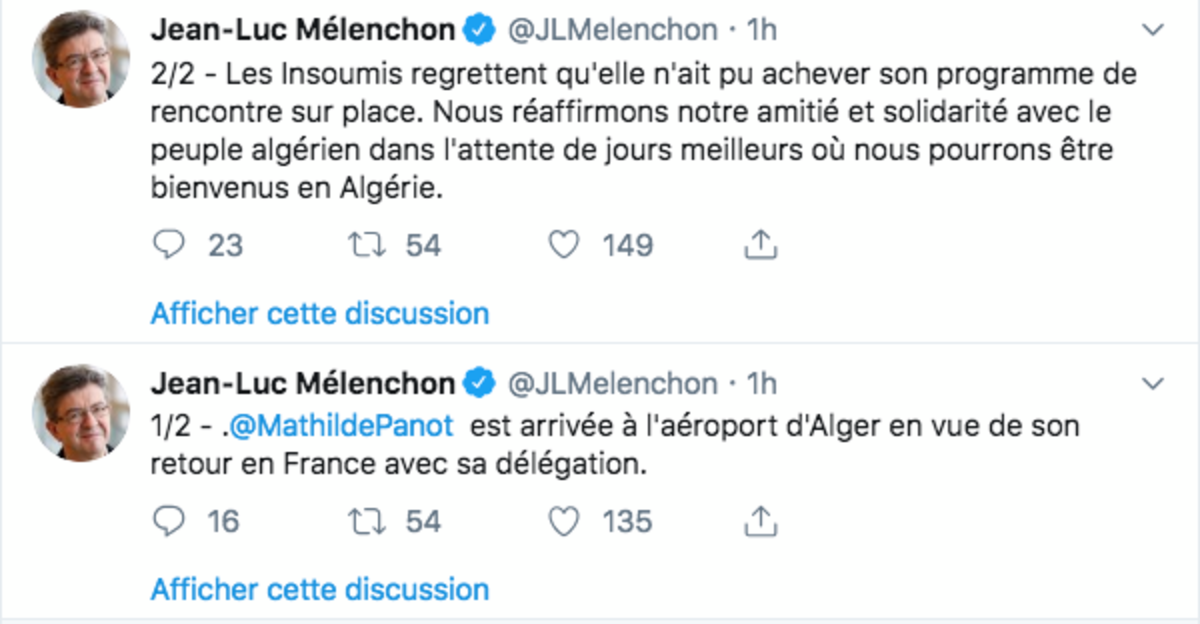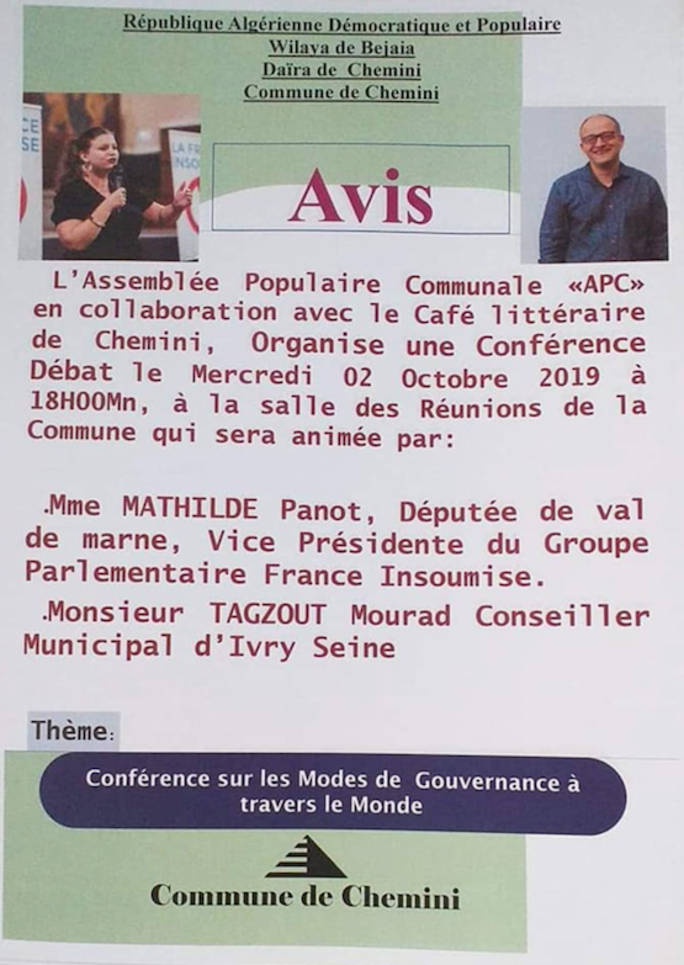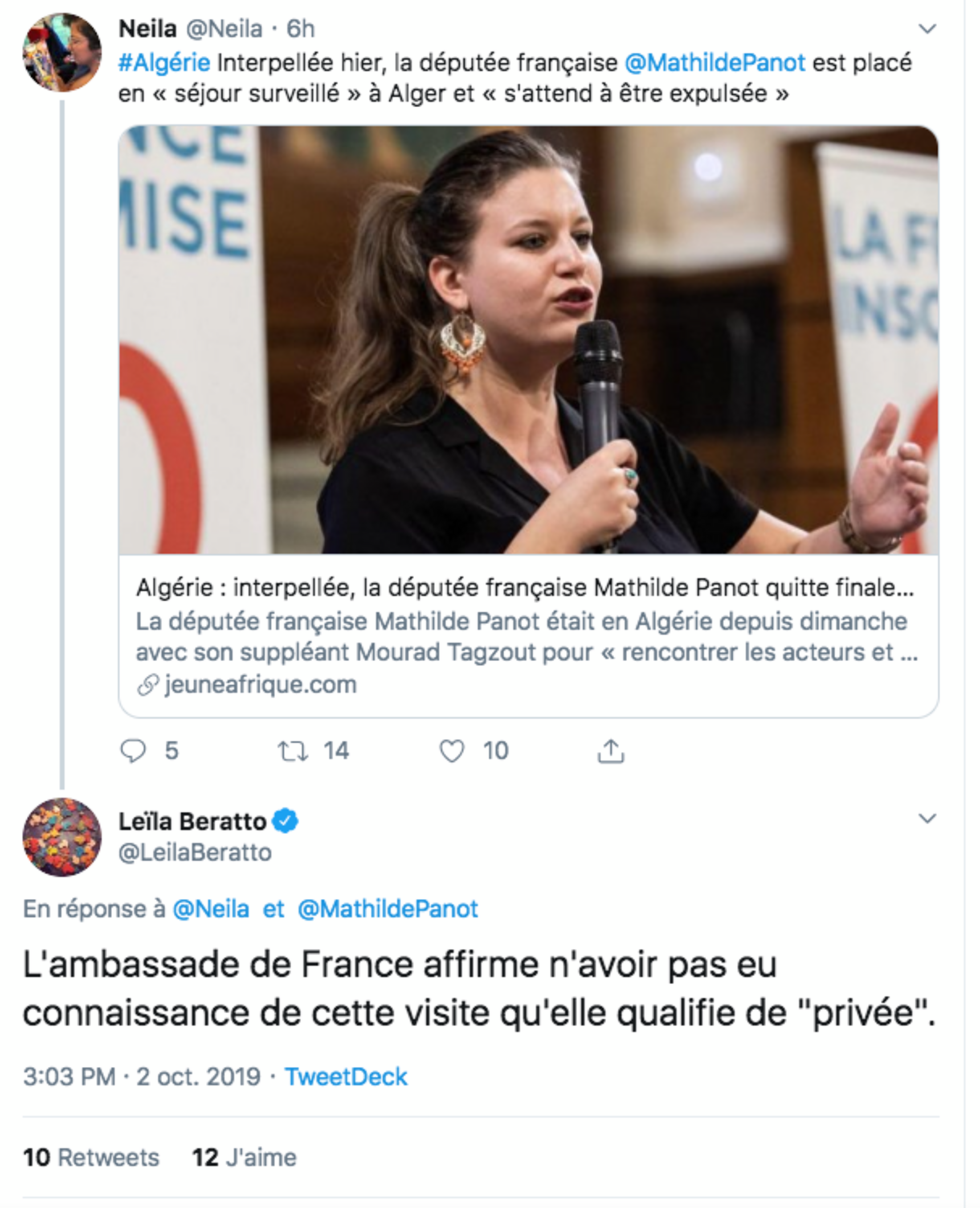Mathilde Panot, a senior Member of Parliament for France's radical left opposition party La France Insoumise (LFI) ('France Unbowed'), was arrested in Algeria and later expelled after meeting protestors opposed to the current regime in the North African country. Manot, who is vice-president of the LFI's Parliamentary group, and her delegation were arrested on October 1st, less than two days after her arrival at Bejaïa in the north of the country. She and her team were then taken to the capital Algiers and effectively placed under house arrest in an hotel by the Algerian authorities.
Her ordeal in the North African country ended on the evening of Wednesday October 2nd when the French government became involved. “Following the intervention by the minister of foreign affairs Jean-Yves Le Drisan, Mathilde Panot and her delegation are on their way to the airport ahead of their return to France,” tweeted the LFI's leader Jean-Luc Mélenchon on Wednesday afternoon.
Mélenchon later deleted that Tweet and replaced it with two others (see below). “Mathilde Panot has arrived at Algiers Airport ahead of her return to France with her delegation,” he wrote. He added: “Les Insoumis regret that she was not able to complete her plans to meet people on the ground. We reaffirm our friendship and solidarity with the Algerian people as we wait for better days when we might be welcome in Algeria.”

Enlargement : Illustration 1

Just a few hours before this announcement Jean-Luc Mélenchon had met the press at the National Assembly to express his concern about what was happening to his MP colleague in North Africa. He told journalists he was “worried...not being alarmist, but worried”.
Mathilde Panot, an MP from the Val-de-Marne département or county south-east of Paris, had intended to visit Algeria for a week. She was accompanied by three staff, including her number two in her constituency Mourad Tagzout, a Franco-Algerian who is a councillor at Ivry-sur-Seine just south-east of Central Paris. According to the LFI she and her group had obtained a week's visa to visit Algeria without any problem. The delegation insist that they were open with the Algerian authorities about the aim of their trip to the country as “observers”, during which they intended to meet several opposition groups.
The current popular movement or 'Hirak' in Algeria helped unseat long-serving president Abdelaziz Bouteflika in early April but it is still calling for full democracy and the rule of law amid political stalemate as the old military-backed regime holds on to power. The regime wants to hold elections in December but opponents say the country's institutions must be overhauled first.
The MP and her delegation were due to take part on Tuesday October 1st in a conference in a town hall which was co-organised by a cafe literature group and the mayor of Chemini, a town 60km (40 miles) from Bejaïa, in the north of the country, on the theme of “Methods of government across the world”.

Enlargement : Illustration 2

Having been arrested initially for an hour during an afternoon demonstration at Bejaïa, the Parliamentary group was arrested again at a police check outside the town as they headed for Chemini. Around ten police officers detained them for three hours, claiming they were acting on instructions “from on high” but without giving any detailed reasons. They were then all escorted to the capital Algiers.
“They took our passports,” Mathilde Panot said on her Facebook page. “The mayor Madjid Ouddak and the elected representative from the province's popular assembly, Reda Boudraa, came to support us. Having still given us no explanation [the police] escorted us to Algiers. It was a 7 hour trip rather than 3 hours 30 minutes because the road was blocked at one place by citizens who were protesting against the unfairness in handing out social housing.”
Having refused to be housed at the French ambassador's residences, because dual national Mourad Tagzout was not made welcome there, Mathilde stayed in an hotel in the capital with her three colleagues. The hotel was placed under guard by the Algerian police.
There was then a lengthy delay before the French Embassy and the France's Ministry of Foreign Affairs took action to get the group back to France. Jean-Luc Mélenchon said on Wednesday that he “did not understand this situation which doesn't seem to be being handled by anyone. We don't have any representatives to talk to. That's why we have called in the press because nothing's happening.”
Jean-Luc Mélenchon, who is usually outspoken in his views, was noticeably low-key and careful in his choice of words saying he “respected the Algerian government” as well as the “chief of police” there. “If we're not welcome, no problem, we ask to return to France,” said the LFI leader and MP for the Bouches-du-Rhône in the south of France. “It was clear that we were not getting mixed up in any active politics in Algeria, we weren't there to interfere in internal politics. We love Algeria, the Algerians, we come in a spirit of friendship. We just ask one thing – to leave.”
According to journalist Leïla Beratto from French public broadcaster RFI (see Tweet below), the French Embassy in Algeria said they did not have any prior knowledge of this trip by the MP, and said they described it as a “private” visit. “[The authorities] asked [the MP] questions about her coming. She came on a tourist visa but in my view as soon as she arrived in Algeria she was flagged,” said Reda Boudraa from the Bejaïa popular assembly, equivalent to a regional council. He described meeting the French MP. “I met her first on Tuesday during the demonstration. As with each Tuesday there was a students' march. She took part in it, she spoke to people and she followed us to the court where we end each demonstration to call for prisoners of conscience to be freed,” he said.

Enlargement : Illustration 3

Reda Boudraa said he quickly went “in support” to the police checkpoint where the delegation was arrested and had their passports confiscated. “I got the news from the mayor of Chemini, the town to which they were going,” he explained.
The arrest of a French MP and her team does not come as a surprise to many given the current situation in Algeria. It was perhaps even predictable given that Ahmed Gaïd Salah, the head of the armed forces in Algeria who are the real power in the country, is cracking down again in order to be able to hold the presidential election in December and undermine the 'Hirak' or popular movement which has continued for nearly eight months with little sign of weakening.
The authorities in the North African country have been carrying out mass arrests for weeks now and imprisoning ordinary demonstrators, symbolic figures in the protests and opposition politicians such as the highly popular Karim Tabbou, founder of the democratic and social union party the Union Démocratique et Sociale (UDS) and former first secretary of the country's oldest opposition party the Socialist Forces Front (FFS).
Having been arrested then released on September 12th, Tabbou was arrested again a few days later and put into custody, increasing still further the number of political prisoners. Lakhdar Bouregaa, a veteran of the Algerian war of independence, was recently detained. Another opponent inside prison is Louisa Hanoune, head of Algeria's Workers' Party and a figure on the radical left, who has just been handed a 15-year jail term after a two-day trial in which she and the former president Abdelaziz Bouteflika's brother Said were accused of conspiring against the authorities and the army.
Critics of the regime say the presence of so many political prisoners is a sign that it is resorting again to its old methods to crush the population which is resisting it and the democratic forces which are trying to organise opposition.
It is also clear that MP Mathilde Panot and her number two, Mourad Tagzout, must have been aware they and the rest of the delegation were running the risk of arrest in a country that remains a 'democraship'; a regime which is authoritarian but with a veneer of democracy.
Mathilde Panot and her team may well have fuelled the regime's paranoia by loudly announcing on social media, and in particular the MP's Facebook page, their presence in the country as “activists for the citizens' revolution”, “in solidarity with the activists of the Hirak”, “to understand, learn and express our solidarity to this revolution of smiles [editor's note, this is one of the protest movement's nicknames]” and publishing their programme and planned meetings. This is a regime which was already worried about anything or one coming from abroad - in particular from France - and known supporters of the popular movement. In speeches the head of the army Ahmed Gaïd Salah has often referred to “dark forces from abroad who wish us harm”.
It would have been highly unusual for the MP and her team to have got visas in their capacity as members of a French political party. The Algerian regime does not issue visas for journalists who want to cover the Hirak or popular movement. Nor do they for members of foreign non-governmental organisations who want to come in as observers. In August 2019 Ahmed Benchemsi, the advocacy and communications director for Human Rights Watch’s Middle East and North Africa division, was expelled back to Morocco, from where he comes originally and from which country he had entered Algeria. He was arrested on the fringes of a demonstration against the regime and held for ten days in Algeria.
Mathilde Panot and her team were even greater targets because they were in Bejaïa, in the heart of the rebellious Kabylie region of Algeria which the regime is closely targeting. People in this region have rejected the government's plans for a presidential election on December 12th 2019, saying they want changes to the country's institutions first. More than half of the region's local popular assemblies have already announced that they will not supervise the December poll. It is also the area from which Panot's assistant Mourad Tagzout comes.
------------------------------------------------------------------------------
- The French version of this article can be found here.
English version by Michael Streeter


